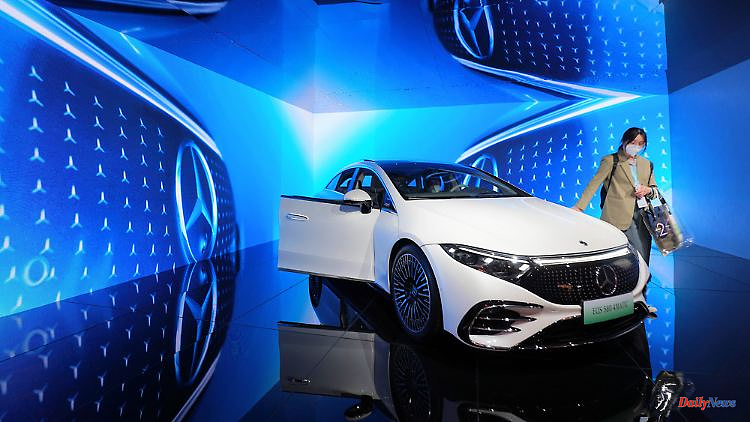On the largest electric car market in the world, things are not going well for the German car manufacturers. BMW, Mercedes and VW remain seated on their Stromern. At the same time, newcomers from China are pushing hard into Europe - especially Germany. An unequal race.
The e-car offensive by German car manufacturers in China threatens to become a non-starter. While the sales figures for combustion engines in the Middle Kingdom were always impressive, the sales figures for electrically powered vehicles are dramatically below those of the Chinese competition. Insurance data from China, available to the "Handelsblatt", show how bad things are with the traditional brands BMW, Mercedes or Volkswagen in detail.
In terms of market share, BMW, Mercedes and Audi failed last year with a measly 0.8, 0.3 and 0.1 percent, even at the modest one percent hurdle. And Volkswagen has no reason to brag either. For purely electric vehicles, the group, which now has 25 factories in China and sells almost every second combustion car there, only has a meager 2.4 percent. The shadowy existence of German car manufacturers in China could develop into a major problem.
China is not only the largest car market in the world and the most important single market for German manufacturers. It is also the world's largest boom market for electric cars. Together, the traditional German forges sell more than a third of their vehicles there - combustion engines, mind you. If the development continues like this, this part of the pie could shrink significantly.
Because the market is in the middle of a massive transformation towards electric cars. In China, change is happening particularly quickly. According to the CPCA, the local car association, the proportion of purely electric cars rose by 90 percent in the previous year. However, out of a total of 5.7 million vehicles, only 200,000 units were made by German brands.
The concrete sales figures show how bad the business of the German big ships is, an industry that provides 800,000 jobs in Germany: The electric model of the VW subsidiary Audi, which is after all the best-selling in Europe, was found in China last year year only 3600 customers. In Germany alone, for comparison, there were 41,286 vehicles. It was even worse for the Audi E-Tron GT RS sports model, of which only 43 were sold, according to the "Handelsblatt". Things are not looking much better for the competition: Mercedes also found only 1,628 customers for its EQS luxury model, and BMW only found 1,684 buyers for its electric SUV iX. For each vehicle, however, buyers had to shell out the equivalent of 77,300 euros each.
The price is only one problem in China: The German car manufacturers primarily serve the luxury segment of electric cars. However, there is a boom in demand above all in price ranges below the equivalent of 40,000 euros. The best-selling battery-powered vehicle in China, the small electric car Wuling Hongguang Mini, found a total of 410,000 customers. The basic price is the equivalent of 14,000 euros. This makes it one of the cheapest convertibles in the world. Third and fourth place went to the Dolphin sedan with over 182,000 registrations and the Yuan Plus SUV from Chinese car manufacturer BYD with almost 150,000 units.
Not only the lower price, but also the extras for digital functions are better received by Chinese buyers. The German car manufacturers are still lagging behind when it comes to language assistants and networking with Internet services, as well as when it comes to drive technology, range and charging speed. In addition, the tendentially younger buyers prefer "Made in China" for e-cars. "This national pride is increasing," Gregor Sebastian from the Berlin China think tank Merics told the "Handelsblatt". Only US electric pioneer Tesla can play in China. According to the insurance data, 317,000 units of the Model Y were registered, which means a respectable second place in terms of sales.
The meager sales figures are likely to cause all sorts of things to talk about in the management echelons of VW, BMW and Daimler, but they also bring with them other problems: Foreign car manufacturers usually have to set up joint ventures with local brands in China if they want to produce vehicles locally. If sales continue to be so bad, there is a risk "that the Chinese joint venture partners will prefer the production of their own more successful electric car brands and neglect the joint venture obligations," says the former Audi board member for sales and acting chairman of the engine manufacturer's supervisory board Deutz, Dietmar Voggenreiter the "Handelsblatt".
And that's not the end of it, because the worries don't stop in China. The successful Chinese car manufacturers are pushing into the European market with their cheaper electric cars. What the German manufacturers cannot do in China could work the other way around. BYD, Great Wall Motor, Nio and Xpeng are each aiming for a sales volume of up to 120,000 units per year in the EU in the medium term. BYD, the giant from China that sells the most electric cars in the world, has been offering three of its models in Germany since the beginning of the year. More are planned in the coming months.
According to reports, the company is even considering opening an assembly plant in Germany, writes the "New York Times". The competition is here to stay. BYD is willing to take its time to become competitive in Germany, the newspaper quotes Hedin Mobility Group boss Jan Grindemann as saying. The Swedish company handles imports from BYD to Germany. "We must build BYD as a brand, and we will convince people with quality." According to experts, the outcome of the race between the traditional German companies and the Chinese newcomers is open.












